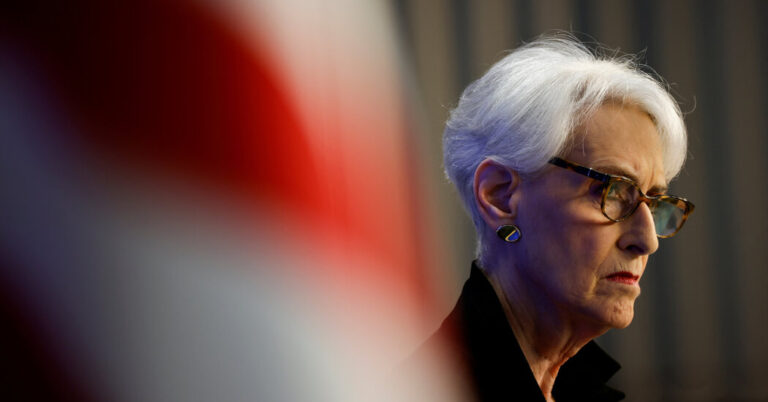
[ad_1]
After Russia had amassed 100,000 troops by Ukraine’s borders in what appeared to be preparations for an invasion, the Biden administration sent one of its top diplomats to talk with her Russian counterpart to try to dissuade Moscow from a full-scale war.
Wendy R. Sherman, the deputy secretary of state, met with Sergei A. Ryabkov in the U.S. mission in Geneva in January 2022. Mr. Ryabkov, Russia’s deputy foreign minister, left at lunch and returned demanding that the United States respond in writing to draft treaties on security issues that his country had presented earlier.
The documents had been nonstarters for President Biden, and Ms. Sherman realized then that Mr. Ryabkov’s demands were cover for an inevitable war.
“We knew that we were going to be off to the races,” she said in an interview on Thursday night.
In an email to State Department employees on Friday morning, Ms. Sherman announced her retirement, 30 years after she set foot in the agency’s headquarters for her first diplomatic job and as the United States is embroiled in the most consequential military campaign in Europe since World War II. She plans to leave her job on June 30.
Ms. Sherman, 73, has been a fixture in foreign policy circles in Washington and capitals worldwide as the go-to diplomat for tough negotiations with U.S. rivals and adversaries: Iran, North Korea, Russia and, mostly recently, China.
Along the way, Ms. Sherman became a role model for women in foreign policy institutions. She was the first woman to serve as deputy secretary of state and, under the Obama administration, as under secretary for political affairs, the third-ranking post in the State Department. She has worked in three Democratic administrations and under five secretaries of state. In her job as deputy secretary alone, she has visited 39 countries.
“For many of us, particularly as a senior woman in national security — there are very few more effective or consequential leaders in foreign policy in recent memory, and then add on top of it even fewer women,” said Suzy George, the chief of staff at the State Department and an associate of Ms. Sherman’s since 1995.
Warren M. Christopher, the first secretary of state under President Bill Clinton, tapped Ms. Sherman, who was working at a media consulting company at the time, for her first job in the State Department, as assistant secretary of state for legislative affairs. Later, under Madeleine Albright, the first female secretary of state, Ms. Sherman worked on Israeli-Palestinian negotiations and North Korea talks. She accompanied Ms. Albright to Pyongyang on the first visit to North Korea by a U.S. secretary of state.
Her toughest diplomatic assignment was arguably leading U.S. negotiators in talks with Iran over a nuclear deal during the Obama administration. In 2015, Secretary of State John Kerry announced a final agreement, which placed limits on Iran’s nuclear program but came under attack from Republican politicians for what they said was a failure to address certain military activities. President Donald J. Trump withdrew from the deal in 2018, which Iran had been abiding by.
In Ms. Sherman’s current post, she has been the point person in the State Department on China policy. She has had to balance competing priorities: working with Secretary of State Antony J. Blinken to maintain channels of communication while also countering China’s policies around the globe. She flew to Tianjin in 2021 to meet with Wang Yi, then the foreign minister, and men in white hazmat suits escorted Ms. Sherman and her colleagues to a hotel.
When the Pentagon detected a Chinese spy balloon drifting over the United States this year, Ms. Sherman called in a Chinese diplomat to deliver a démarche.
“She is kind of the iron lady of U.S. diplomacy,” said Cho Hyun-dong, the South Korean ambassador in Washington, adding that Ms. Sherman had played a “very constructive role” in helping improve relations between his country and Japan.
Jonathan Finer, the principal deputy national security adviser, said Ms. Sherman was the Biden administration’s default diplomat to send for “hard conversations in hard places.”
Mr. Finer and Ms. Sherman visited Kyiv in January, but it was not her first time in Ukraine: In a photograph across from her desk in Washington, she is laying flowers at Maidan Square in Kyiv in 2014, where security forces under a pro-Russia president shot dead dozens of peaceful protesters.
In August, Ms. Sherman visited the Solomon Islands with Caroline Kennedy, the ambassador to Australia. One goal was to signal U.S. commitment to a region where China is making inroads. But Ms. Sherman was also on a personal mission: The occasion was the 80th anniversary of the Battle of Guadalcanal, a signature fight of World War II in which her father, a Marine, was wounded. She carried his green military cap on the trip and brought it with her to a podium when she made a speech.
“It was a very, very powerful time,” Ms. Sherman said. “I landed at the very airstrip from which the Marines fought in World War II, and I landed in a plane marked United States of America.”
[ad_2]